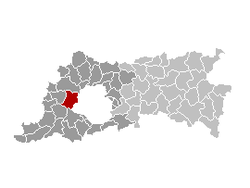Dilbeek
| Dilbeek | |||
|---|---|---|---|
| Municipality | |||

De Viron Castle, serving as town hall
|
|||
|
|||
| Location in Belgium | |||
| Coordinates: 50°51′N 04°16′E / 50.850°N 4.267°ECoordinates: 50°51′N 04°16′E / 50.850°N 4.267°E | |||
| Country | Belgium | ||
| Community | Flemish Community | ||
| Region | Flemish Region | ||
| Province | Flemish Brabant | ||
| Arrondissement | Halle-Vilvoorde | ||
| Government | |||
| • Mayor | Willy Segers (N-VA) |
||
| • Governing party/ies | LvB-Open Vld, CD&V/N-VA/DNA! |
||
| Area | |||
| • Total | 41.18 km2 (15.90 sq mi) | ||
| Population (1 January 2016) | |||
| • Total | 41,450 | ||
| • Density | 1,000/km2 (2,600/sq mi) | ||
| Postal codes | 1700–1703 | ||
| Area codes | 02 | ||
| Website | www.dilbeek.be | ||
Dilbeek (Dutch pronunciation: [ˈdɪlbeːk]) is a municipality in the province of Flemish Brabant, in Flanders, one of the three regions of Belgium. The municipality comprises the villages of Dilbeek proper, Groot-Bijgaarden, Itterbeek (with Sint-Anna-Pede), Schepdaal (with Sint-Gertrudis-Pede), Sint-Martens-Bodegem, and Sint-Ulriks-Kapelle. Dilbeek is located just outside the Brussels-Capital Region, in the Pajottenland, hence the local name Poort van het Pajottenland (Gate to the Pajottenland). Even though Dilbeek is located in the Dutch language area of Belgium, there is a French-speaking minority represented by 4 members (5 in 2000) on the 33-seat local council. It is a mostly residential community with largely preserved rural areas and some industrial zones.
The life of Saint Alena, the 7th-century martyr daughter of a lord of Dilbeek, was set in Dilbeek and Forest (Vorst). The historical facts of her life, however, are disputed. In Carolingian times, Dilbeek and its neighbouring villages were part of the pagus Bracbatensis. This territory, ruled by the Lords of Aa in Anderlecht, was integrated into the Landgraviate of Brabant by the counts of Leuven around 1085. The first mention of the name Dedelbeccha dates from 1075, while the name Bigardis, later transformed into Groot-Bijgaarden (in French Grand Bigard), dates from 1110. Bigardis was originally a dependency of the Abbey of Saint Bavo in Ghent, but by 1125, nuns under the leadership of had founded a religious community there. Around 1183, the landgraviate became the Duchy of Brabant, within which Dilbeek remained as an independent parish until the French Revolution.
...
Wikipedia




